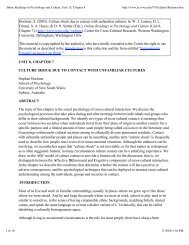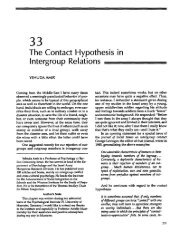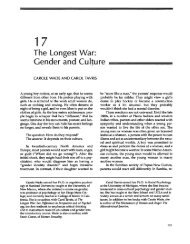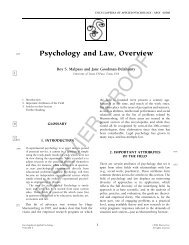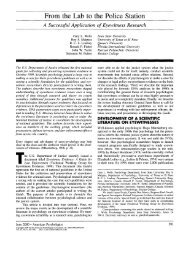Behavior across Cultures: Results from Observational Studies
Behavior across Cultures: Results from Observational Studies
Behavior across Cultures: Results from Observational Studies
Create successful ePaper yourself
Turn your PDF publications into a flip-book with our unique Google optimized e-Paper software.
110 15/ <strong>Behavior</strong> <strong>across</strong> <strong>Cultures</strong>: <strong>Results</strong> <strong>from</strong> <strong>Observational</strong> <strong>Studies</strong><br />
farming communities were engaged in work more<br />
than 20 percent of the time, while U.S. and !Kung<br />
Bushmen children spent just 5 percent or less of<br />
their time working. We may ask why it is that the<br />
farmers stay busier than other peoples. Although<br />
the reasons are not known with any certainty, we<br />
can point to two classes of activities to which farmers<br />
must devote considerable time, whereas only<br />
one of them is performed steadily by hunter-gatherers,<br />
and only the other by us in the urban-industrial<br />
world. Farmers, and ourselves, spend a good<br />
deal of time doing chores, for instance, food preparation<br />
and storage, housekeeping, purchasing and<br />
taking care of material goods, laundering clothes,<br />
and so forth; but hunter-gatherers, who accumulate<br />
but minimal property, are spared much of this effort.<br />
Farmers also must dedicate time to subsistence<br />
labor, an activity in which they are joined by<br />
hunter-gatherers, but not by us, since we have specialists<br />
(farmers, ranchers, fishermen) whom we<br />
pay to do this work. So agriculturalists seem to be<br />
kept busy on both fronts, and we and the hunting<br />
peoples are seriously engaged in only one of these<br />
time-consuming activities. Whatever the reasons<br />
for agrarian industriousness, though, the surprise<br />
has been that as we observe work activities in<br />
societies varying sharply on the scale of cultural<br />
complexity, we do not find time-use patterns developing<br />
in a simple linear fashion.<br />
Besides demonstrating the usefulness of observational<br />
research, each of the above sets of studies<br />
also illustrates the value of cross-cultural investigation<br />
generally (cf. Whiting, 1968). The findings on<br />
childhood aggression have helped us answer the<br />
question of whether a sex difference in Westembased<br />
findings was culture-specific or held up<br />
among people in general. The study of infant care<br />
among Aka fathers has enabled us to extend the<br />
range of known behavior; that is, it has discovered<br />
a set of behaviors that were normative in one culture<br />
even though exhibited by few or no individuals<br />
in other cultures. And the issue of labor and<br />
cultural complexity has posed a question that was<br />
cross-cultural in its very formulation, requiring<br />
data <strong>from</strong> several different types of societies if any<br />
findings were to be generated. Thus a cross-cultural<br />
perspective has enhanced the contribution of all the<br />
sets of studies we have considered.<br />
We noted above that a host of topics are open to<br />
study by observational techniques. For instance,<br />
many who work in Third World countries believe<br />
that young children should be fed five small meals<br />
a day. Although we may question the need for ex-<br />
actly five periods of food intake every day, the<br />
broader point is that children are more likely to<br />
achieve proper physiological development if they<br />
eat frequently. Implicit in such beliefs is the idea<br />
that children should and do eat more frequently<br />
than adults. As it happens, we can easily find out<br />
whether cross-culturally, under naturalistic conditions,<br />
this hypothesis receives support. Allen<br />
Johnson of UCLA has inaugurated a cooperative<br />
venture involving the publication, by the Human<br />
Relations Area Files, of a collection of standardized<br />
time-use databases. Now available for a total of<br />
eight societies ranging over several continents, the<br />
databases can be rapidly consulted to ask whether<br />
children do in fact eat and drink more frequently<br />
than adults. And the answer is yes, they are so<br />
engaged. For a total of twelve possible comparisons<br />
(youths vs. adults, toddlers vs. adults, etc.) for<br />
which such data were presented, every single one<br />
showed more time invested in eating by the<br />
younger groups than by the adults.<br />
The great number of observational studies have<br />
focused on cultural patterns rather than individual<br />
differences, and on gross behavioral categories<br />
(e.e.. infant care, labor) rather than micro-level be-<br />
~ ".<br />
havior. But the varied approaches to observational<br />
research in standard psychological study (cf. Weick,<br />
1985) might lead us tosuspkt that these previous<br />
foci are not the only bases on which cross-cultural<br />
behavioral observation can be founded. One recent<br />
cross-cultural study, for instance, compared fatherabsent<br />
boys with father-present boys, and the dependent<br />
measure was eye-gaze, the issue being<br />
whether in natural settings the father-absent boys<br />
paid more attention or less attention to males in<br />
their social environments. It turned out that fatherabsent<br />
boys looked more frequently at males, perhaps<br />
in unconscious compensation for the fact that<br />
they did not regularly have an adult male model in<br />
the home. (The attention of girls to males was unrelated<br />
to father absence in these samples.) Approaches<br />
of this sort, with a concentration on<br />
individual differences and molecular levels of behavior,<br />
can provide data that are complementary to<br />
traditional observational research in cross-cultural<br />
settings.<br />
LIMITATIONS<br />
The more sensitive and private aspects of people's<br />
lives are essentially off-limits to observational research.<br />
Observation-based inquiry is also not the



